Kingdom‘s Lure
A few days ago a story about alleged right-wing disdain for Ridley Scott’s Kingdom of Heaven (20th Century Fox, 5.6) appeared in the London Times. **
The paper’s L.A. correspondent John Harlow reported that “Christian hostility” to the film (the righties don’t like it that some of the Crusaders are portrayed as selfish and “mean-spirited,” and they really don’t like it that Saladin, the Muslim military leader, is portrayed in “chivalrous” terms) may prove “damaging” at the box office.
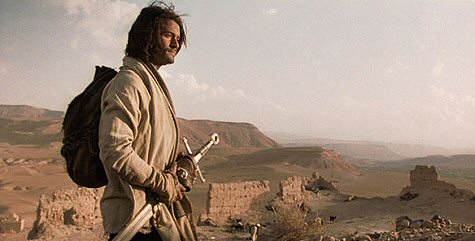
Orlando Bloom during relatively early scene in Ridley Scott’s Kingdom of Heaven.
Harlow wrote that “a spate of hostile reviews are due to appear in the increasingly influential religious press this week [that] will urge America’s 80 million born-again believers to avoid the $130 million film.”
Trust me — the righties are loony. One of the things I admire about Kingdom of Heaven is that it doesn’t draw crude stereotypes and is fairly even-handed in its portrayals of Christians and Muslims. Christian foam-at-the-mouth views about this are agenda-driven and skewed.
< ?php include ('/home/hollyw9/public_html/wired'); ?>
I wonder, in any case, if fans of The Passion of the Christ care all that much about the reputations of Christian Crusaders? As Revolution Pictures exec (and former 20th Century Fox distribution chief) Tom Sherak says, “That [Times] story is interesting but you know something? If people want to go to a movie, they’re going to go to it.”
And yet it’s significant, I feel, that the right-wing Christians vs. Kingdom of Heaven story is being seen as some kind of good thing. Controversy creates curiosity and leads to ticket sales, etc.
Others suspect it may be a case of too little, too late. The fact is that Ridley Scott’s big-budget epic — a beautifully made, epic-styled drama about the Muslim siege of the Christian-defended Jerusalem in the 12th Century — is looking to number-watchers and data crunchers like a passable performer, at best.
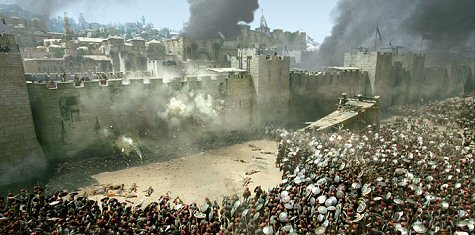
Before I get into this, let me say one thing: forget all this crap and just go. If you’re a fan of fine pageant-level filmmaking, Kingdom of Heaven is an essential. What do you care what others think?
That said, I think it’s fair to ask, as other journalists have done, whether Kingdom of Heaven will do better domestically than Hollywood’s last three historical battle epics — Alexander, King Arthur and The Alamo — which all turned out to be duds.
Especially considering that Heaven opens only a week from today (5.6) and research data suggests that average-viewer interest isn’t where it should be.
How many people really know what Kingdom of Heaven is about, given that the basic story comes off as a bit vague in the trailers?
How many people out there give that much of a toss about the Crusades, or have a clue what they were about?
How big of a mainstream draw is the film’s star, Orlando Bloom? He rules with 15 year-old girls but does he mean anything to the 25-and-over crowd?
Is Kingdom going to be a Troy-styled success, with modest returns in the U.S. but double-sized or better grosses overseas?
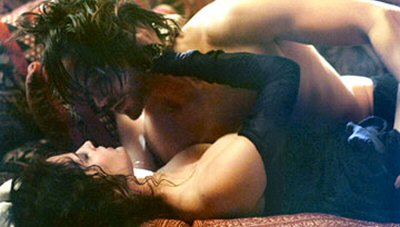
Bloom and Kingdom costar Eva Green.
Ask around and opinions vary. Some marketing executives are pessimistic or doubtful; others are uncertain or mildly positive.
A senior marketing executive based at a major studio said a couple of days ago that audience interest in Kingdom of Heaven is, according to tracking data, not that great.
“It’s hard to say what [Fox marketing] could be doing differently at this point,” he said. “But if I were handling this film, I would definitely be very nervous at this point. It’s a difficult story line to communicate…the biggest problem they have is communicating that. But it’s not over until it’s over.”
“I don’t have any delusion that this movie is going to be a colossal blockbuster, but you’ve got to watch the numbers every day,” a seasoned box-office analyst said Friday morning. “If the numbers don’t move after this weekend, they’re in trouble. If they do move, they’ll be fine.”
Two days ago an executive from a marketing boutique agency said, “What’s making me happy about Kingdom of Heaven is that it seems to have a solid older audience, which means it’s the kind of film that won’t drop a lot. People are going to go to it over a period of weeks, and interest among the four quadrants — young males and females and older males and older females — is averaging about 39, which is fairly good. So I don’t think you can count ’em out.”
“Right now, this movie is positioned somewhere in between where Gladiator, King Arthur, Troy and The Last Samurai were,” said Sherak. “This movie is really about Ridley Scott. The question is, will it have any heat going into the marketplace next week? It isn’t Gladiator, but right now the numbers are solid.”
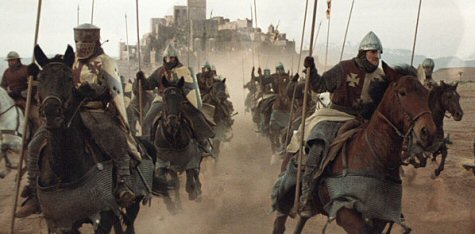
A veteran marketing executive disagrees. He says the film “is an ill-conceived project and it stars Orlando who? Think of Master and Commander without Russell Crowe. The title is lousy, the ending doesn’t work, the creative materials don’t tell you anything, they don’t have an advance-review campaign underway, it sounds like a three-snore picture and I’m telling you that the Fox people are worried sick.”
It was suggested during research on this story that I examine “comparables” to get an idea how Kingdom of Heaven is doing compared to the awareness and interest levels in Gladiator, King Arthur, Troy and The Last Samurai one week before their respective openings.
The figures come from a private industry tracking service called Cinesys, which provides its data to clients through National Research Group (NRG).
Based on telephone polling, it measures levels of unaided awareness (i.e., people knowing about a film without being told what its title is), general awareness, definite interest, and whether or not seeing this or that film is a first-choice selection.
As of today (Friday, 4.29), one week before opening, Kingdom of Heaven‘s unaided awareness is at 4%, general awareness is at 65 %, definite interest is at 40 % and 7% of the respondents called it a first-choice selection.
A marketing guy says, “One week from the opening and a 7% first choice for a movie of this cost and stature is toilet time, no matter how you look at it.”
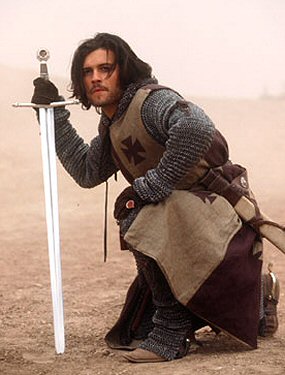
One week before its 7.7.04 opening, King Arthur‘s unaided awareness was 4%, general awareness was at 76%, definite interest was at 48%, and 6% called it a first-choice selection. I don’t have the whole spreadsheet before me, but the IMDB says that King Arthur took in just over $51 million domestic.
The next three films had big stars in the lead role, so take these comparisons with a grain of salt.
One week before its 5.14.04 opening, Troy‘s unaided awareness was 17%, general awareness was 84%, definite interest was at 59%, and 18% called it a first-choice selection. Troy took in $133 million in the U.S., but the foreign totals were at least double that.
One week before its 5.5.00 opening, Gladiator‘s unaided awareness was 6%, general awareness was 75%, definite interest was 44%, and first choice was at 13%. It ended up with about $187 million domestic and a very healthy overseas gross.
One week before its 12.5.03 opening, The Last Samurai‘s unaided awareness levels were at 9%, general awareness was 81%, definite interest levels were at 42%, and first choice was at 6%. It was a groaner, but it wound up making $111 million domestic.
One way to build up interest in a high-profile film is to run advance rave reviews from major critics or get Time or Newsweek to run a feature story a week or two out. This hasn’t happened.
A friend tells me he heard a Kingdom of Heaven radio ad this morning that used a plug from CNN talk-show host Larry King. If that isn’t a sign of trouble, I don’t know what would be.
I disagree with the marketing veteran’s notion that Kingdom of Heaven ‘s ending doesn’t work.

I’ll repeat what I said in my 4.18 column: “Has there ever been a big expensive film about warring armies in which one side didn’t triumph absolutely? In which the loser wasn’t totally beaten down and slaughtered?
“I felt amazed and lifted up when this didn’t manifest…when life and sanity, in effect, is chosen over death and fanaticism.
And I think Orlando Bloom acquits himself in the lead role. Grimy and unshaven, he stands up and shoulders his responsibility like a man.
In the previous piece I called Heaven “a textural masterpiece” and “a big-canvas historical drama that dares to be different. It’s a complex and unusual thing… and what got me is the beauty of the brushstrokes. That and the avoidance of the usual usual.”
I’m seeing it again tonight and I`m looking very much forward to this. I only wish more people felt the same way.
Hold On…
There’s some kind of confusion about whether Focus on the Family film critic Bob Waliszewski is leading some kind of San Juan Hill charge against Kingdom of Heaven. It’s been suggested by Fox publicity sources that John Harlow of the London Times may not have it right, but I’m not sure either way because I can’t reach him.
In any case Fox sent me a statement from Bob Smithouser, editor of a site called Plugged In, which casts doubt upon the Waliszewski angle:
“Due to one journalist’s recent misrepresentation of Bob Waliszewski’s comments regarding the new Ridley Scott film Kingdom of Heaven, some people have been misled to believe that Focus on the Family is rallying forces against the movie. That’s simply not true.”
“Mr. Scott’s film about the Crusades actually deserves credit for carefully avoiding the wholesale vilification of either Christians or Muslims. While people of faith may object to individual moments, statements or characters in Kingdom of Heaven, the movie is not extreme or malicious, and we are content to let it succeed or fail on its own merits.”
This has no bearing on the marketing data aspects of my lead article about Kingdom of Heaven. I could rewrite the damn thing and just cut out the right-wing stuff at the beginning, but it’s easier to do it this way…for now.
Crop Calls
I absolutely swear to God there’s a great-looking Warner Home Video DVD of Elia Kazan’s A Face in the Crowd (1957) hitting stores a week from Tuesday (5.10).
It has terrific monochrome values, I mean…sharp and super-clarified and almost color-like in their fullness.
There’s only one problem: WHV technicians have cropped the image too tightly and presented it in what looks to me like a 1.85 (or 1.78) to 1 aspect ratio, with too many hairdos and foreheads sliced into for no reason.
A Face in the Crowd was photographed by Harry Stradling, who started out in the 1920s, shot A Streetcar Named Desire and ended his career working on a string of ’60s Barbra Streisand movies, including Funny Girl and Hello Dolly.
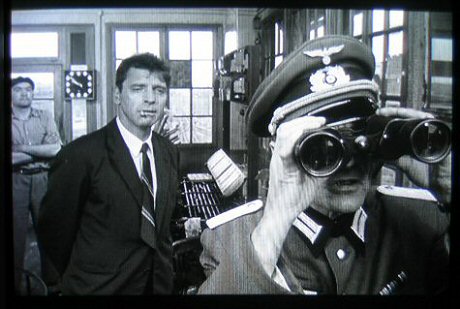 A scene from John Frankenheimer’s The Train, presented in more-or-less correct 1.66 to 1 aspect ratio on the MGM/UA Home Video DVD. Notice the sense of visual balance and breathing space around everyone’s head.
A scene from John Frankenheimer’s The Train, presented in more-or-less correct 1.66 to 1 aspect ratio on the MGM/UA Home Video DVD. Notice the sense of visual balance and breathing space around everyone’s head. 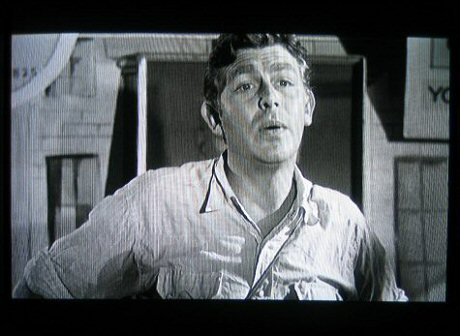
An early scene from Elia Kazan’s A Face in the Crowd, presented with an overly severe aspect ratio (seemingly 1.85 to 1) on an upcoming (5.10) Warner Home Video DVD. Notice the top of the frame scissoring into Andy Griffith’s pompadour.
Trust me when I say that old-fashioned guys like Stradling never used the top of the frame to crop into people’s heads, unless there was an emotional or compositional point to be made by doing so.
DVDs of almost all non-Scope movies shot in the 1950s and ’60s should
be presented with 1.66 to 1 aspect ratios. I don’t care if the dp on a certain ’50s or ’60s film composed the shots with an expectation that 1.85 aperture plates would be used in theatres (because 1.85 was being used back then) — just use 1.66 and don’t think about it and don’t get creative and just shut up.
That is, except for special-dispensation films like Shane and Dr. Strangelove, which look much better when presented with a full-frame aspect ratio of 1.33 or 1.37 to 1.
MGM/UA Home Video’s DVD of John Frankenheimer’s The Train does it right. There’s a perfect sense of balance and proportion in every shot, and here are no scenes with anyone’s hair or forehead sliced into except when this kind of shot is appropriate and intended.












